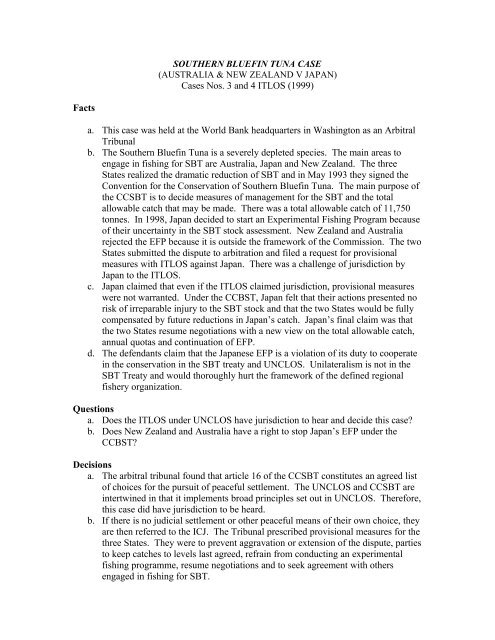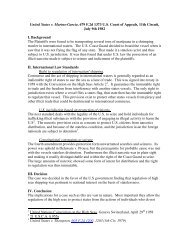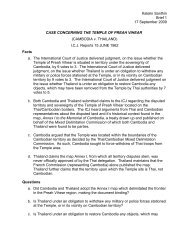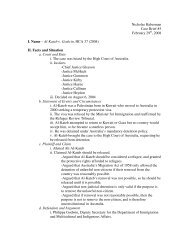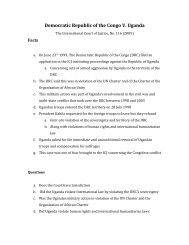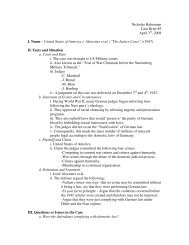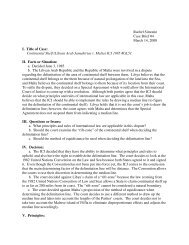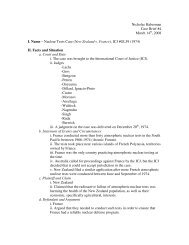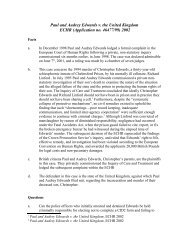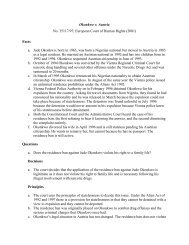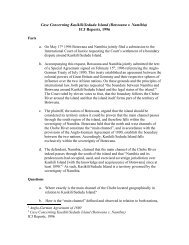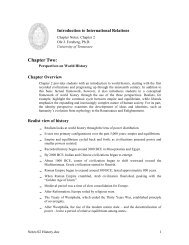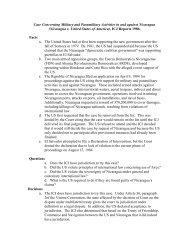SOUTHERN BLUEFIN TUNA CASE - Courses
SOUTHERN BLUEFIN TUNA CASE - Courses
SOUTHERN BLUEFIN TUNA CASE - Courses
Create successful ePaper yourself
Turn your PDF publications into a flip-book with our unique Google optimized e-Paper software.
<strong>SOUTHERN</strong> <strong>BLUEFIN</strong> <strong>TUNA</strong> <strong>CASE</strong>(AUSTRALIA & NEW ZEALAND V JAPAN)Cases Nos. 3 and 4 ITLOS (1999)Factsa. This case was held at the World Bank headquarters in Washington as an ArbitralTribunalb. The Southern Bluefin Tuna is a severely depleted species. The main areas toengage in fishing for SBT are Australia, Japan and New Zealand. The threeStates realized the dramatic reduction of SBT and in May 1993 they signed theConvention for the Conservation of Southern Bluefin Tuna. The main purpose ofthe CCSBT is to decide measures of management for the SBT and the totalallowable catch that may be made. There was a total allowable catch of 11,750tonnes. In 1998, Japan decided to start an Experimental Fishing Program becauseof their uncertainty in the SBT stock assessment. New Zealand and Australiarejected the EFP because it is outside the framework of the Commission. The twoStates submitted the dispute to arbitration and filed a request for provisionalmeasures with ITLOS against Japan. There was a challenge of jurisdiction byJapan to the ITLOS.c. Japan claimed that even if the ITLOS claimed jurisdiction, provisional measureswere not warranted. Under the CCBST, Japan felt that their actions presented norisk of irreparable injury to the SBT stock and that the two States would be fullycompensated by future reductions in Japan’s catch. Japan’s final claim was thatthe two States resume negotiations with a new view on the total allowable catch,annual quotas and continuation of EFP.d. The defendants claim that the Japanese EFP is a violation of its duty to cooperatein the conservation in the SBT treaty and UNCLOS. Unilateralism is not in theSBT Treaty and would thoroughly hurt the framework of the defined regionalfishery organization.Questionsa. Does the ITLOS under UNCLOS have jurisdiction to hear and decide this case?b. Does New Zealand and Australia have a right to stop Japan’s EFP under theCCBST?Decisionsa. The arbitral tribunal found that article 16 of the CCSBT constitutes an agreed listof choices for the pursuit of peaceful settlement. The UNCLOS and CCSBT areintertwined in that it implements broad principles set out in UNCLOS. Therefore,this case did have jurisdiction to be heard.b. If there is no judicial settlement or other peaceful means of their own choice, theyare then referred to the ICJ. The Tribunal prescribed provisional measures for thethree States. They were to prevent aggravation or extension of the dispute, partiesto keep catches to levels last agreed, refrain from conducting an experimentalfishing programme, resume negotiations and to seek agreement with othersengaged in fishing for SBT.
Principlesa. The main principles of this case fall under the articles in the UNCLOS and in theConvention for the Conservation of Southern Bluefin Tunab. Article 290(6) of the UNCLOS was the deciding principle in this case stating thatthe parties in dispute must comply with the provisional measures set forth underthe article.c. This case also illustrates the principles of Arbitral TribunalsConclusionThere are many current fishery disputes with disagreements over catch limits andconservation. The Law of the Sea is very vague which means that disputes must beaddressed thoroughly in the UNCLOS. It seems to be very hard to develop workablepolicies in the area of fishery management which means that the disputes can worsen andmany more cases will develop. This case was important because it shows the importanceof cooperation and negotiation in a regional organization. UNCLOS and ITLOS hopethat these cases will set precedence for those trying to cause more disputes concerningfishing.BibliographySouthern Bluefin Tuna Cases, Judgment, ITLOS 1999SubmittedKerry E Hancock, November 5, 2009


